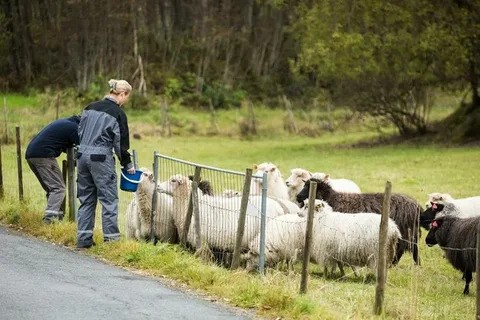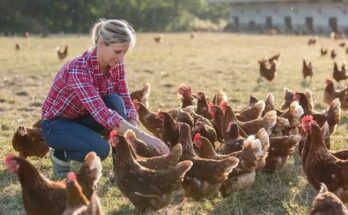Sheep Farm Jobs in Canada
Ever thought about working on a rural Canadian sheep farm? It might sound niche, but sheep farm jobs in Canada are quietly emerging as appealing roles for seasonal workers, immigrants, and locals alike. With in-demand skills like animal husbandry, livestock management, and fence maintenance—and the added bonus of fresh air, space, and community—these jobs offer real opportunity. In this guide, we’ll cover how much you can expect to earn, the basic requirements, how to apply (including visa options), and what a day in that life might look like. Let’s shear into it.
Why Sheep Farm Jobs in Canada Matter Right Now
-
Labor shortages in agriculture—many provinces face shortages of skilled farm labor.
-
Niche expertise valued—sheep farming demands specialized care (lambing, shearing, health checks), so employers pay for experience.
-
Pathway to rural settlement—some regions offer immigration streams tied to agri-work.
-
Lifestyle appeal—if you’re drawn to quiet life, open skies, and meaningful work, this is rich ground.
Typical Pay & Benefits
Note: Exact data is scarce, and pay varies by province, duties, and experience.
Estimated Wage Ranges:
-
Entry-Level Farm Workers: CAD 16–18/hour
-
Experienced Shepherds/Technicians: CAD 18–22/hour
-
Specialized Roles (Shearing, Veterinary Aid): CAD 22–28/hour
Workers may also receive:
-
On-farm housing or room and board
-
Seasonal bonuses at lambing and shearing
-
Food or produce as part of compensation
-
Overtime or premium pay during peak lambing seasons
(These figures reflect similar agricultural roles and reasonable estimates in rural Canada.)
What Employers Look For
Required Skills & Traits
-
Physical stamina and willingness to work long shifts outdoors
-
Basic knowledge of sheep care: feeding, lambing, parasite control
-
Fence building, barn maintenance, and safe animal handling
-
Shearing or hoof-trimming experience is a strong advantage
Educational & Language Requirements
-
No formal education required—practical experience is king
-
Agricultural certificates are a plus, especially from programs like those at Olds College or Lakeland College
-
English proficiency needed for safety and communication onsite
Immigration & Visa Options
-
Many sheep farm jobs are seasonal and can be applied to under the Seasonal Agricultural Worker Program (SAWP) or general TFWP (Temporary Foreign Worker Program)
-
Some Provincial Nominee Programs (PNPs) nominate agri-workers for permanent residency if you have the right experience and stay duration
Where to Find Sheep Farm Jobs
-
Job Bank often lists farm labor and livestock roles (search “sheep farm worker”)
-
Provincial agriculture boards (e.g., Saskatchewan Ministry of Agriculture) post farm jobs
-
Farming associations (e.g., Canadian Sheep Federation) may share leads
-
Rural Facebook groups and word-of-mouth in farming communities remain effective
Real-Life Scene: A Day on a Canadian Sheep Farm
Meet Luis, originally from Portugal—hired through SAWP to a sheep farm near Saskatoon. His day starts before sunrise, checking ewe health and feeding lambs by hand. In spring, his camel-weighted workday runs 10 hours including fence checks and assisting gardeners. By season’s end, he earns enough to save for winter, gain Canadian references, and return next year. He says, “This isn’t easy—but every sunrise over green fields? That’s worth it.”
FAQs
Q: How much do sheep farm jobs in Canada pay?
A: Expect CAD 16–18/hour for entry-level work, CAD 18–22 for shepherd roles, and up to CAD 28 for specialists. Additional perks like housing or seasonal bonuses often sweeten the deal.
Q: Do I need prior experience to get hired?
A: Not always. Farms may hire enthusiastic newcomers—but if you’ve done lambing, shearing, or fence building before, you’re a strong candidate.
Q: Can non-Canadians apply for these jobs?
A: Yes. Seasonal programs like SAWP or a work permit under TFWP are common pathways. Some provinces include agri-workers in permanent immigration streams via PNP.
Q: Are on-farm accommodations common?
A: Yes. Especially with remote sheep farms, employers often provide housing or room & board as part of compensation.
Q: What’s the job outlook?
A: Rural agriculture, especially sheep farming, faces labor shortages—and many farmers prefer reliable, experienced help. This need likely continues.
Is It Right for You?
If you’re physically fit, love animals, and want meaningful work with a rural edge—and maybe a pathway to Canadian life—sheep farm jobs offer more than just a paycheck. You’re part of farm tradition, hands-on, and you’ll learn fast. This isn’t glamorous work, but for the right person, it’s grounded, honest, rewarding—and even life-shaping.
From Fields to Futures
Sheep farm jobs in Canada are more than seasonal gigs—they’re opportunities to grow, whether you’re aiming to build Canadian experience, save for your future, or connect deeply with land and livestock. Entry-level earns respect; specialized work pays better. If you’re ready to trade suit for overalls, city scenes for sunrise barns, and routine emails for daily fresh air—this could be your path.
Let those fields call you. Start applying, get dirty, learn fast, and build toward whatever comes next—with each lamb and fence post as your milestone.



